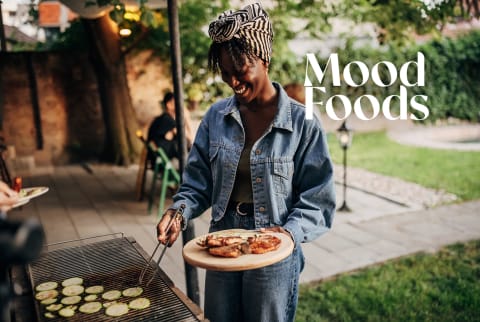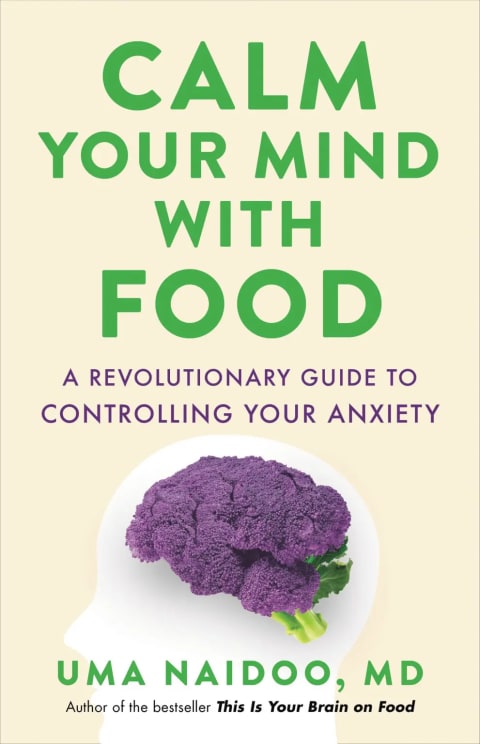Advertisement
A Nutritional Psychiatrist's Go-To Dishes For A Brain-Healthy BBQ


As a nutritional psychiatrist, I always look forward to the summertime for the sunshine (which helps me replenish my vitamin D on a daily basis) and of course, the delicious seasonal foods that also nourish my brain. With Labor Day approaching, here are some of my favorite brain-friendly foods for your end-of-season BBQ.
Build a better burger
Premade burger patties can be filled with refined oils and carbohydrates that are not great for brain health or mood. Research suggests that consuming processed foods leads to increased biomarkers of inflammation1 in the body, which has a well-established link with increased symptoms of depression and anxiety and implications in unhealthy aging.
An easy way around this is to form your own patties using your favorite meat (such as beef, bison, or turkey), fish (I love salmon), or vegetables (homemade lentil or black bean burgers are great). Grilling clean proteins, such as tofu, tempeh, or pasture-raised meat is also a healthy choice.
Give veggie garnishes a starring role
Instead of thinking of lettuces, tomatoes, and onions as lowly garnishes, why not give them a starring role?
They certainly bring plenty of health benefits to the table: Onions and garlic provide prebiotic fiber to help heal your gut, tomatoes are rich in the antioxidant lycopene and have neuroprotective properties2, and lettuce is a great source of heart-healthy folate.
You can also throw some brain-healthy cruciferous veggies on the grill. Brush a simple marinade onto broccoli or cauliflower florets, add different colored peppers and grape tomatoes, and then grill on skewers. These foods provide the brain with key nutrients that promote a sense of calm and relief from anxiety. Pro tip: Tomatoes have up to five times more lycopene in their skin, so eat those with the skin on!
Reduce the risk of carcinogens
While we all enjoy barbecuing, it's important to know that some toxic byproducts of grilling3 can impact our brain and physical health, as they are potentially carcinogenic. But there's no need to panic. Here are some ways to minimize the formation of both PAH (polycystic aromatic hydrocarbons) and HCAs (heterocyclic amines) the next time you fire up the grill:
- Use leaner cuts of meat. In general, the quality of the meat is more important than any concern about the fat content when you are using lower-heat cooking methods. For high-heat grilling, though, prioritizing leaner cuts can prevent the formation of PAH and HCA4.
- Limit the amount of burnt or charred food you eat. Wrap vegetables, fruit, or even meats (try fish!) in foil packets to protect them.
- Opt for a gas grill, which allows you to better control the temperature.
- Use marinades5 that contain olive oil, garlic, fruits, or spices like turmeric (especially when cooking meats). They may help reduce the formation of these potentially toxic substances.
Pump up the parsley
I love adding fresh chopped parsley to my BBQ salad greens for a delicious and bright flavor. I also use the gut-healthy herb in a Chimichurri sauce to top grass-fed beef, grilled tofu, or (my personal favorite) a cauliflower steak.
One of my pillars of nutritional psychiatry is to regularly include herbs and spices in the diet, including parsley, so I recommend incorporating this brain food into your regular rotation of as much as your taste buds would like!
Dress everything up
My go-to, simple, fresh salad dressing is a blend of extra-virgin olive oil, lemon juice, and a dash of salt and pepper. This makes every salad taste fresh and savory while adding a healthy dose of brain-fueling omega-3 fats. Try drizzling it on grilled proteins, as well, for a fresh and tangy flavor!
Serve hydrating drinks
While the hot weather might have us craving sweet soft drinks, these aren't the best for us. Instead, I love serving flavored water using the fresh berries that summer brings. Hydration is key for optimal brain health, so water is, in fact, a brain food! More evidence is needed to confirm this recommendation, but as I describe in my first book, "I have had patients who experience worsening of anxiety or even full-blown panic attacks when they are dehydrated and do not realize it."
To make chilled sparkling water more exciting, infuse it with a few berries of your choice—I'm turning to fresh blueberries and raspberries—and serve with a dash of lime juice. This refreshing drink brings all the flavor, antioxidants, and fiber—and none of the sugar.
Don't forget the avocado
This fruit (yes, it's a fruit!) is a staple on my summer menu. I'll add some on top of fresh salads or grain bowls or blend it into a dip for a burst of key minerals that help us produce mood-supporting neurotransmitters in the brain6.
Bring on the color
Nutritional psychiatry encourages eating a colorful variety of fruits and vegetables to nourish our bodies and brains with fiber and nutrients, as well as fuel both gut health and mental health. Try to eat the rainbow at your next barbecue with green broccoli, red and yellow tomatoes, orange and purple carrots, etc.
Wrap up the festivities with watermelon
Watermelon is not only delicious, but it may also help to reduce anxiety in a couple of ways: It is a good source of vitamin C7 (a key vitamin for mental health support8) and polyphenols, which promote the growth of beneficial bacteria in the gut. As its name suggests, watermelon is also an excellent source of water.
The takeaway
To cap off this summer, I'm filling my plate with the most colorful, calming, and mood-boosting dishes that I can and enjoying them with my loved ones. The foods on this list are all a treat for the taste buds—and the brain. What's your go-to?
8 Sources
- https://www.ncbi.nlm.nih.gov/pmc/articles/PMC10058108/
- https://www.ncbi.nlm.nih.gov/pmc/articles/PMC7464847/
- https://pubmed.ncbi.nlm.nih.gov/26259039/
- https://www.ncbi.nlm.nih.gov/pmc/articles/PMC9024867/
- https://pubmed.ncbi.nlm.nih.gov/10578481/
- https://www.ncbi.nlm.nih.gov/pmc/articles/PMC8551489/
- https://www.ncbi.nlm.nih.gov/pmc/articles/PMC9692283/
- https://pubmed.ncbi.nlm.nih.gov/23226848/


















